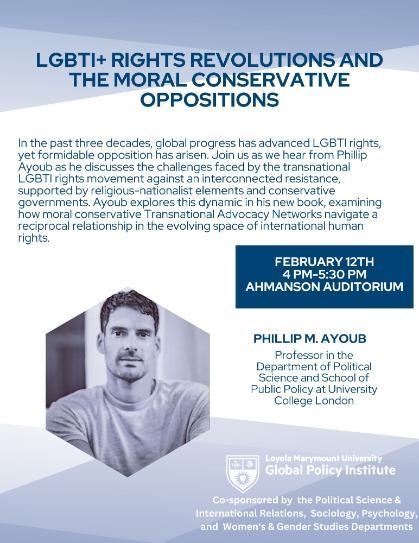LGBTI Rights Revolutions and the Moral Conservative Oppositions

Monday February 12th | 4-5:30pm
Ahmanson Auditorium
- About the Event
- About the Speaker
-
In the past three decades, remarkable progress has been made in numerous countries for the rights of individuals marginalized due to their sexual orientation and gender identity. The advancements in LGBTI rights in a variety of diverse countries can largely be attributed to the tireless efforts of the transnational LGBTI rights movement, forward-thinking governments in pioneering nations, and the evolving human rights frameworks of international organizations. However, this journey towards equality has been met with formidable opposition. An increasingly interconnected and globally networked resistance, backed by religious-nationalist elements and conservative governments, has emerged to challenge LGBTI and women's rights, even seeking to reinterpret and co-opt international human rights law. Moral conservative TANs have employed many of the same transnational tools that garnered LGBTIQ people their widespread recognition. As the double-helix metaphor suggests, rival TANs have a reciprocal relationship, having to navigate each other’s presence in an interactive space and thus using related strategies and instruments for mutually exclusive ends.
Phillip Ayoub is a Professor in the Department of Political Science and School of Public Policy at University College London. As the Editor of the European Journal of Politics & Gender, he obtained his Ph.D. from Cornell University and has held academic positions at Drexel University and Occidental College. His research focuses on transnational politics, sexuality and gender, norm diffusion, and social movements, exploring how the mobilization of marginalized groups and international visibility impact socio-legal change. Ayoub's book, "When States Come Out: Europe’s Sexual Minorities and the Politics of Visibility," was published by Cambridge University Press in 2016.
Ayoub's work has been featured in prominent journals, including the American Political Science Review and Comparative Political Studies. He has received numerous grants and fellowships, such as the Fulbright Schuman Fellowship and the European Research Council Grant. Awards include recognition from the American Political Science Association and the Council for European Studies. They teach courses on international relations, comparative politics, social movements, sexuality and politics, European politics, and research methods.